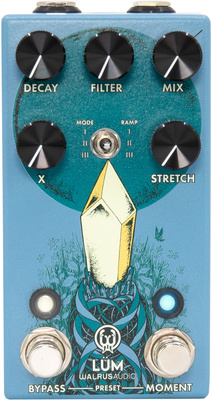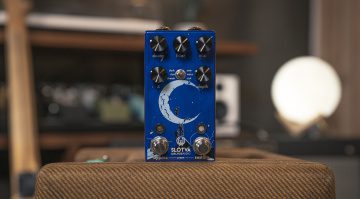Walrus Audio Lüm Texture Engine: Fairytale Ambiences

The Walrus Audio Lüm Texture Engine is the latest limited-run release from the brand, and offers players another chance at ambient effects, this time of the granular variety.
Walrus Audio Lüm Texture Engine
Walrus Audio loves creating ambient effect pedals, and this latest release takes some of their previous designs and adds some elements to the Lüm Texture Engine.
They also took inspiration from the algorithms of Fable, Lore, and Slö, combining elements of all three to create a new ambient sound.
Three Modes
There are three effect modes available, and each has something different to offer.
- Grain Cloud: Granular cloud with two granular taps fed into a feedback delay line.
- Grain Verb: A granular reverb, this one “reads” two granular taps from the reverb effect. It’s great when combined with distortion.
- Forward-Reverse Verb: A forward reverb algorithm that transitions into a backward reverb algorithm.
Use the three-way switch in the middle to select a mode, and then use the five controls to adjust the detailed settings.
Automation
The Lüm offers a wide range of sounds just with its three modes, but it also has a trick that’s rare for a pedal: you can automate each of the five controls between two different settings using the Moment footswitch.
Controls
Decay controls the reverb time, Filter dampens peaks in the signal, and Mix adjusts the blend of dry and wet signals.
The X control changes depending on which of the three modes you’re in. In Grain Cloud and Grain Verb, it adjusts the size and frequency of the grains. In Forward-Reverse Verb, it lets you set the reverb time for the reverse reverb. Finally, Stretch continuously adjusts the sample rate from half to double.
You can set a starting value for a parameter, such as the Mix control, and then a final value. When you press the Moment footswitch, the Lüm will automatically shift the parameter from the start to the end value. You can also control the speed of this transition with options for 10 ms, 1000 ms, or 5000 ms.
For a smoother sound, the optional Trails function lets the reverb tail fade out naturally even after you bypass the effect.
Price & Availability
You can get the Walrus Audio Lüm Texture Engine for $293 /£263/€299 at Thomann. And you’d better act fast, because the pedal is limited to 600 units worldwide.
If you enjoyed the Slö Reverb, Lore Reverse Reverb, and Fable Granular Generator, then this pedal is probably for you.


More Information
2 responses to “Walrus Audio Lüm Texture Engine: Fairytale Ambiences”

 4,9 / 5,0 |
4,9 / 5,0 | 











Granular delay/reverb is so 2022.
Everyone is so over it.
I never liked this kind of effect in the first place and think it sounds unmusical.
It’s kind like the effects version of fusion jazz rock music. All tech, no soul.
Effects designers need to come up with new effects that are not only innovative but also, that lend themselves well to enhancing actual human performances instead of making a human performance sound like robotic digitalization gobbledigook.
AI music is going to take the place of all this robotic and sterile sounding music that has polluted the musical world for the last couple of decades since Auto-Tune became a standard way of laziness for music producers to make something like music that isn’t really music.
After 25 years of relying on computers to do all the heavy lifting, the computer has learned how to do it on its own. Not hard when you make music that relies 100% on software that digitally removes all human qualities from the music.
Humans better find a way to make real music now or they won’t have a place in the music world.
Effects companies need to start designing effects devices that enhance human performance instead of trying to replace the human generated source with some kind of digitalized garble.
take your meds you are talking crazy.